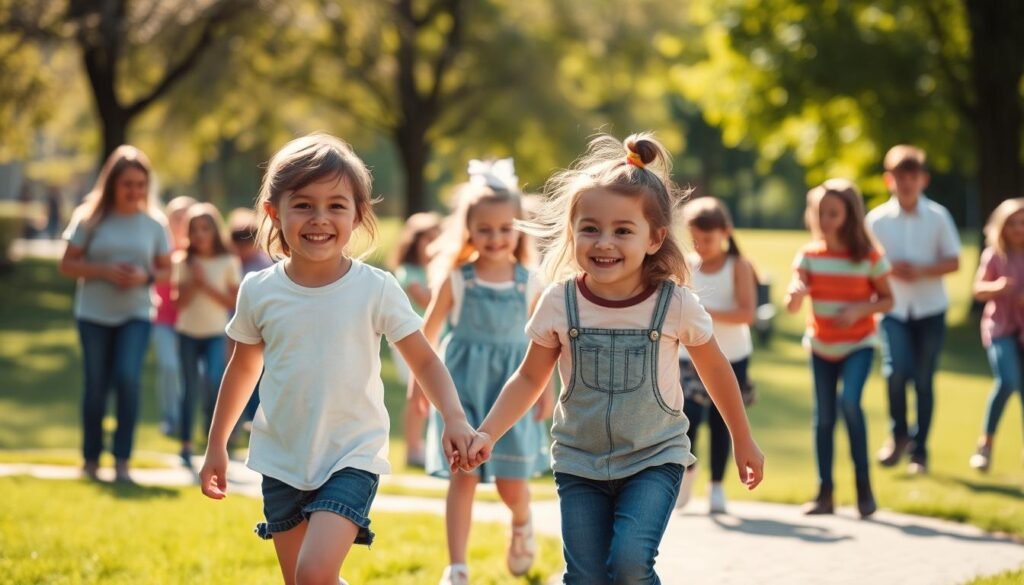In today’s fast world, kindness is key. The idea of 5Kind is to grow kindness to better our lives and those around us.
Practices like mindfulness and meditation boost our kindness. Also, gratitude changes our view, making us more positive and understanding.
The goal of 5Kind is to help mental health through kindness. By adding kindness to our daily routine, we build a caring community.
Key Takeaways
- Cultivating kindness improves mental health and well-being.
- Mindfulness and meditation are effective tools for boosting kindness.
- Focusing on gratitude promotes positivity.
- Kindness is vital for holistic healing.
- Practicing kindness daily fosters a supportive community.
Understanding the Importance of Kindness
Kindness is a simple yet powerful tool that can change lives and communities. In a world filled with stress and negativity, kindness offers a break and reminds us of our shared humanity.
Why Kindness Matters in Daily Life
Kindness is important because it creates a positive environment. It promotes mental health and wellness. Small acts, like holding the door or smiling, can make someone’s day better.
These acts not only help the person receiving them but also make the giver feel better too.
According to “How to Spread Kindness in Your Workplace,” kindness has a big positive impact. By adding kindness to our daily lives, we can build a more supportive and caring society.
The Ripple Effect of Kind Acts
The ripple effect of kindness means one act can inspire others, creating a chain of goodwill. Seeing or experiencing kindness makes us more likely to do the same, spreading positivity.
This effect is seen in many areas of life, from personal relationships to community projects. For example, a kind act towards a neighbor can strengthen the community.
| Kind Act | Immediate Effect | Ripple Effect |
|---|---|---|
| Donating to charity | Helping those in need | Inspiring others to donate |
| Volunteering time | Supporting community projects | Encouraging others to volunteer |
| Offering a kind word | Brightening someone’s day | Creating a more positive environment |
Kindness in Challenging Times
In tough times, kindness offers comfort and strength. It can be as simple as supporting a friend or helping a stranger. Kindness brings solace and reassurance.
Kindness also builds resilience in individuals and communities. By showing empathy and compassion, we can face challenges better together.
For example, during hard times, kindness initiatives like food banks and volunteer programs helped a lot. They provided essential support and brought people together, saving communities a lot of money.
Practical Ways to Show Kindness
Showing kindness is a simple yet powerful way to make a positive difference in the world. By incorporating small acts of kindness into our daily routines, we can create a ripple effect that spreads far and wide.
Simple Acts for Everyday Kindness
Everyday kindness can be as simple as holding the door for someone, giving a genuine compliment, or sending a kind message to a friend. Jennifer Wilhoit’s interview highlights show that writing and listening are significant acts of kindness that can greatly impact someone’s day.
Some simple ways to practice everyday kindness include:
- Smiling at strangers
- Offering your seat to someone in need
- Writing gratitude journals
- Practicing mindfulness and meditation to be more present and aware of others
Volunteering: Giving Back to the Community
Volunteering is a meaningful way to show kindness to the community. By giving our time and skills, we can help those in need and contribute to the betterment of society.
Some volunteering opportunities include:
- Helping at local food banks or shelters
- Participating in community clean-up events
- Assisting at animal shelters
- Mentoring or tutoring those in need
Kindness in the Digital Age
In today’s digital world, kindness can be shown in various online ways. This includes sending kind messages, sharing positive content, and supporting online communities.
Some ways to practice kindness online include:
- Sharing uplifting stories or videos
- Offering support and encouragement on social media
- Participating in online forums that promote positivity and kindness
Practicing kindness, whether online or offline, can have a significant impact. Here is a comparison of the benefits of different kindness activities:
| Kindness Activity | Benefits | Cost |
|---|---|---|
| Volunteering | Community development, skill sharing, networking | Free |
| Online Kindness | Global reach, accessibility, low effort | Free |
| Simple Acts | Personal connection, stress reduction, mood boost | £0 – £5 |
The Science Behind Kindness
Research shows kindness has big benefits for our mind and body. When we’re kind, our body releases endorphins, or “feel-good” hormones. These hormones make us feel happier and less stressed.
Psychological Benefits of Being Kind
Kindness greatly improves our mental health. It helps lower anxiety and depression by making us feel connected. Being kind also boosts our self-esteem and overall happiness.
- Improves mental health by reducing symptoms of anxiety and depression
- Enhances self-esteem through positive interactions
- Fosters a sense of community and belonging
Kindness is also a key part of self-care. By focusing on others, we can forget our own worries. This gives us a fresh view and lowers our stress. Adding mindfulness and meditation to our routine can make kindness even more powerful.
How Kindness Affects Physical Health
Kindness is also good for our body. Studies show it can lower blood pressure, reduce chronic pain, and boost our immune system. The joy we feel from being kind can even help us live longer.
- Lower blood pressure due to reduced stress
- Reduced chronic pain through the release of endorphins
- A stronger immune system supported by positive emotions
Adding kindness to our daily routine is easy. Just hold the door for someone or send a nice message to a friend. These small actions can make a big difference in our health. By being kind, we not only feel better but also help our community become more caring and supportive.
Being kind can also save money on healthcare. For example, a study might show that spending £1 on kindness programs can cut healthcare costs a lot. This shows kindness is not just good for us but also for our wallets.
Kindness and Relationships
Kindness is key to building strong, meaningful connections with others. It makes our daily interactions better and deepens our relationships.
Building Stronger Connections through Kindness
Kindness is essential for strong, supportive relationships. Showing kindness improves someone’s day and strengthens our connection. Margaret Meloni shares insights on kindness in the workplace.
Practicing kindness is simple. It can be as easy as giving a genuine compliment or thanking someone for their efforts.
Here are some ways to strengthen connections through kindness:
- Active listening
- Showing gratitude
- Offering help when needed
- Being present in conversations
By doing these, we create a positive and supportive environment in our relationships.
The Role of Kindness in Conflict Resolution
Kindness is also vital in resolving conflicts. Approaching conflicts with kindness leads to solutions that please everyone. It helps reduce tension and encourages constructive dialogue.
“When we practice kindness, we begin to understand the other person’s perspective, leading to more effective conflict resolution.”
Here are the benefits of kindness in conflict resolution:
| Benefits | Description |
|---|---|
| Promotes Understanding | Kindness helps in understanding the other person’s perspective. |
| Diffuses Tension | A kind approach can reduce the tension in conflicts. |
| Fosters Constructive Dialogue | Kindness encourages a more positive and constructive conversation. |
Using kindness in conflict resolution leads to better outcomes and stronger relationships. Valuing kindness helps create a harmonious social environment. This contributes to our overall wellness and mental health.
Reflecting on kindness in our lives shows its importance. Even small acts can greatly impact someone’s day. Kindness benefits both the giver and the receiver, improving our self-care and mindfulness.
By making kindness a habit, we build a culture of positivity and gratitude. This leads to a better life for everyone. The cost of kindness is low, but its benefits are immense, like investing wisely in others’ well-being.
Encouraging Kindness in Children
Teaching children to be kind can change their lives for the better. It helps them grow into caring and understanding people.
Teaching Kindness through Everyday Actions
Showing kindness to kids is easy with simple actions. Parents and caregivers can act kindly by sharing, helping, and being polite. These actions show kids that being kind is important.
- Share stories that highlight kind characters and their actions.
- Engage in activities that promote empathy, such as role-playing different social scenarios.
- Encourage children to help others, whether it’s a family member or a friend in need.
Kindness Activities for Families and Schools
Kindness activities in families and schools help build a kinder world. They teach kids the value of kindness and give them chances to practice it.
- Create a “Kindness Jar” where family members or classmates can write down acts of kindness they witness or experience.
- Organize community service projects that children can participate in, such as cleaning a local park or serving at a food bank.
- Develop a “Kindness Challenge” that encourages children to perform a certain number of kind acts within a set timeframe.
By making kindness a part of daily life, kids learn its value. This can make them happier and healthier.

Research shows that teaching kindness to kids is good for their mental health and social skills. By focusing on kindness, we can build a more caring community.
The Impact of Kindness on Mental Health
Kindness is a powerful tool for our mental health in today’s world. It can reduce stress, improve our mood, and make us feel happier and more fulfilled. Studies show kindness has a big positive effect on our mental health.
Kindness as a Tool for Reducing Anxiety
Kindness can greatly reduce anxiety. When we do kind things, we focus less on our own worries. This gives us a mental break and helps us relax. The Dalai Lama said, “Be kind whenever possible. It is always possible.” This helps those with anxiety feel calmer and more at peace.
Kindness also makes us more mindful and present. Helping others keeps us in the moment, away from past or future worries. Meditation and deep breathing can also calm our minds and lessen anxiety.
Promoting Emotional Well-being through Acts of Kindness
Kindness boosts our emotional well-being too. Doing kind things makes us happier and more fulfilled. It gives us a sense of purpose and connects us to others. This is great for those feeling lonely or isolated, as kindness brings a sense of community.
Kindness also makes us more grateful and positive. Helping others makes us appreciate our own lives more. Even small acts of kindness, costing as little as £1, can greatly improve our emotional well-being.
By adding kindness to our daily lives, we support our mental health and develop a more positive mindset. Whether it’s a small act or a big gesture, kindness’s benefits last a long time.
Building a Kind Workplace
Kindness in the workplace is key to success. It makes the work environment better and more productive. By being kind, businesses can thrive.
Fostering a Culture of Kindness at Work
To create a kind workplace, we need to encourage kindness and empathy. This can be done through:
- Recognizing and rewarding kind acts
- Providing training on empathy and emotional intelligence
- Encouraging team-building activities that foster collaboration and mutual respect
Margaret Meloni says kindness in the workplace boosts morale and productivity. It makes employees happier and less likely to leave. This is a win-win for everyone.
The Benefits of Kindness in Professional Settings
Kindness in the workplace has many benefits. It makes employees feel better and work better together. Some benefits include:
- Increased employee engagement and motivation
- Improved collaboration and teamwork
- Enhanced creativity and problem-solving skills
By focusing on kindness, companies can improve wellness and self-care. This leads to happier employees and saves money. It’s a smart investment in employee well-being.
Celebrating Kindness in Your Community
Communities worldwide are joining hands to celebrate kindness. They do this through various events and initiatives. This effort spreads positivity and wellness and builds a culture of empathy and care.
Kindness is key in our lives, and communities are taking notice. They’re launching campaigns for self-care, mental health, and mindfulness. For example, some places have started “5Kind” challenges, where people do five acts of kindness a day. These efforts improve individual well-being and foster a culture of gratitude and kindness.
Events and Campaigns Promoting Kindness
Many events and campaigns are popping up to promote kindness. There are charity runs, kindness weeks, and volunteer programs. For example, a local charity might host a fundraising event. Participants donate £5 for every kilometer they run, with the money going to mental health initiatives.
As one community leader said,
“When we come together to show kindness, we create a ripple effect that can change lives.”
Recognizing Local Acts of Kindness
It’s important to recognize local kindness to encourage more people to join in. Communities can set up programs to celebrate those who have shown great kindness. This can be through awards or public recognition.
For example, a community might start a “Kindness Hero” award. Local residents can nominate people who have shown extraordinary kindness. This not only honors the nominees but also inspires others to be kind, creating a cycle of kindness for all.
Sharing Your Kindness Journey
Sharing your kindness journey can inspire others and spread positivity. By sharing your experiences, you encourage others to start their own kindness journeys. This builds a community that values compassion and empathy.
Documenting Your Acts of Kindness
Documenting your kindness is a great way to share your journey. Jennifer Wilhoit shows how writing about kindness can inspire others. Keeping a journal or writing stories about your kindness can reflect its positive impact.
Recording your kindness helps you see patterns and areas for growth. This reflection aids in personal development and keeps you committed to kindness.
Benefits of Documenting Kindness:
- Reflects on the positive impact of kindness
- Identifies patterns and areas for growth
- Provides a valuable tool for personal development
- Helps stay committed to the kindness journey
Inspiring Others through Storytelling
Storytelling is a powerful way to inspire and share your kindness journey. By sharing your stories, you connect with others who value kindness. You can use writing, social media, or public speaking to share.
Sharing your stories not only inspires others but also strengthens your commitment to kindness. It motivates you to keep practicing and sharing kindness, creating a positive cycle.
You can share your stories on social media, using hashtags to reach more people. Joining local events or campaigns, like the 5Kind initiative, is also a great way to share your experiences.
Tips for Inspiring Others:
- Use storytelling to create a sense of connection
- Share your experiences on social media
- Participate in local kindness events and campaigns
- Be authentic and sincere in your storytelling
By sharing your kindness journey and inspiring others, you contribute to a larger movement. This movement promotes positivity, wellness, and holistic healing. Remember, every small act counts, and together we can make the world more compassionate and empathetic.
The Future of Kindness
Kindness is always important, even as the world changes. In today’s fast world, being kind is key for happiness and health. The 5Kind movement shows us how small acts can make a big difference.
Embracing Change with Kindness
In a world that’s always changing, kindness helps us stay grounded. By being mindful and grateful every day, we can build a kinder world. This helps our mental health and makes us feel better overall.
Nurturing a Culture of Kindness
To keep kindness alive, we need to make it a part of our daily lives. Small actions, like holding the door or sending a kind message, can spread joy. By focusing on kindness and self-care, we can make a positive impact on our communities and beyond. Let’s keep growing kindness, making a world where everyone can flourish, without extra cost.
FAQ
What is 5Kind and its mission?
5Kind aims to make the world a better place by spreading kindness. It does this through mindfulness, meditation, and gratitude. These practices help improve kindness and overall well-being.
How can kindness impact daily life?
Kindness boosts mental health and supports self-care. It also creates a positive environment. This leads to a more compassionate and positive world.
What are some simple acts of kindness that can be practiced daily?
Simple kindness includes volunteering and being kind online. It’s also about small actions like holding doors or sending kind messages. These actions build a culture of kindness.
How does kindness affect mental health?
Kindness lowers anxiety and boosts emotional well-being. It acts as a therapy tool, releasing endorphins and fostering a positive mindset. This improves mental health outcomes.
Can kindness be taught to children?
Yes, kindness can be taught to kids through everyday actions. Activities in families and schools help cultivate kindness in young minds. This has long-term benefits for their well-being and relationships.
How can kindness be incorporated into the workplace?
Kindness in the workplace starts with creating a culture of kindness. Recognizing kindness’s benefits and promoting a positive work environment boosts morale and productivity.
What is the science behind kindness?
Kindness has psychological benefits like better mental health and reduced stress. It also improves physical health, lowering blood pressure and chronic pain. This makes kindness a valuable tool for wellness.
How can kindness be celebrated in communities?
Communities can celebrate kindness through events and campaigns. Recognizing local kindness and fostering a culture of compassion are key. This promotes kindness and compassion in the community.
Why is it important to share kindness stories?
Sharing kindness stories inspires others and promotes a culture of kindness. It guides on how to share kindness stories effectively. This helps create a more compassionate and positive world.
How can kindness remain relevant in an ever-changing world?
Kindness stays relevant by being practiced in personal and community life. Tips on daily kindness practices are essential. Emphasizing kindness’s ongoing importance helps create a more compassionate world.







